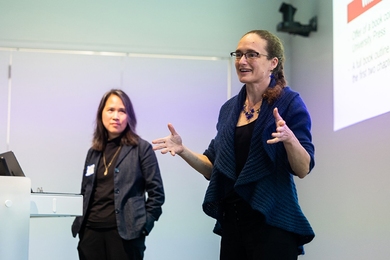Cell phones have transformed the micro-culture of classrooms and may shape the macro-culture of global youth, according to two experts in mobile communications and cultural change who gave talks at an MIT Communications Forum, "Cell Phone Culture," held on Thursday, Nov. 17, in Bartos Theater.
The "Cell Phone" panelists were James Katz, professor of communications at Rutgers University and director of the Center for Mobile Communications Studies, and Jing Wang, S. C. Fang Professor of Chinese Languages and Culture at MIT.
Katz focused on how cell phone use has altered social norms in classroom micro-climates and in public spaces within the United States.
MIT students in the "Cell Phone Culture" audience seemed especially alert when Katz described research on "teledensity" and the contested "micro-culture" of classrooms at Rutgers.
Due to "teledensity," i.e. number of cell phones owned and used by students, the classroom microclimate has new rules of engagement, Katz said.
According to Katz, only 4 percent of Rutgers students surveyed said it was "OK to talk on a phone in class" -- good news for professors, it seemed. Now for the dark side: 41 percent found checking messages OK during class; 45 percent found exchanging text messages permissible and 33 percent of students found it within norms to play games on a cell phone during class.
Katz described newly acceptable behaviors -- known as "territoriality and choreography" -- that people perform to find space or separate from a group to accommodate a cell phone conversation, and said those behaviors are all ways of "privileging the distant other over co-present friends."
Some interior public spaces, especially restaurants, are still "contested terrains," Katz noted, with certain spaces, notably Amtrak's "quiet car" and New York's Metropolitan Museum of Art, demarcated as cell-phone-free.
Wang portrayed a different cultural landscape in China, where cell phones are widely used in place of standard telephones and where transnational businesses are working to create a profitable youth music market.
Wang described "linglei" -- "cool" and alternative -- youth in Beijing as very different from Western youth in their experiences of popular music and mobile music technology, particularly iPods.
"Since only people who have U.S. or European credit cards can purchase music from iTunes, Chinese iPod owners use the gadget to convert music from their CD collections, which are made of cheap pirated CDs. The Apple vision -- 'iPods and iTunes were born together' -- is irrelevant in China," she said.
In her discussion of potential cultural changes arising from cell phone use, Wang noted an "irony: while transnational mobile phone makers are trying to create a youth market for mobile music -- for example, Motorola aspires to make music phones that will become an alternative iPod -- the notion of mobile music as understood in the West still remains an abstract concept even in urban China, even among the most trendy young generation," she said.
Wang also noted that the impact of the Cultural Revolution gave Chinese audiences only 10 years to digest 50 years of Western music.
"As a result, Chinese 'linglei' youth are extremely hungry for a fusion of musical styles. So jazz, electronic music, rock and roll and hip-hop have all become popular in China, and youth owe no allegiance to a single musical genre," she said.
A version of this article appeared in MIT Tech Talk on November 30, 2005 (download PDF).





